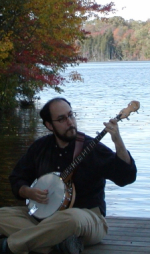Reader Ben Collins-Sussman sent us this letter after watching a group of hobbyist banjo players in an Internet forum shy away from sharing music because they were worried about copyright issues. It’s hard to add to Ben’s eloquent outrage, but we should step back and ask: how did we get here? When did the inconceivable become everyday? When did musicians start censoring themselves as a matter of course? (Notice how copyright issues actually come up twice, independently, in the forum Ben points to. That’s two times in a discussion that’s only nineteen posts long. It would be nice if this were somehow exceptional… but sadly, it’s not.)
Here’s Ben’s letter:
I frequent exciting websites like www.banjohangout.org, where banjoists from all over the world (all 12 of us!) talk about banjos, songs we like, how to play things, and so on.
This forum thread is depressing:
People are talking about how much they like this recording of a new piece of banjo music by Steve Martin (yes, it’s the same Steve Martin!), and saying how happy they are that Steve tabbed it out into a monthly banjo magazine. At some point, somebody asks if anyone has the tab written out for the banjo ‘accompaniment’ played against Steve’s banjo in the recording (by the famous Bela Fleck). Somebody else responds that Bela Fleck’s teacher, Tony Trischka, taught him (in person) how to play the accompaniment, but is afraid to write it down on paper and share it with others, because of possible “copyright issues.”
For centuries, musicians have been teaching and learning from each other, imitating and improvising together… and now we have some hobbyists who are afraid to show each other how one particular person happened to improvise some accompaniment on one particular recording? Yeesh.


What an interesting thread! I recently read an essay by John Barlow that was written in 1994. Barlow discusses how with the “third wave” of economic development, in which information replaces land and other tangible items as the mainstay of our economy, a new system of intellectual property protection is needed to replace the now-defunct copyright laws.
Barlow makes an interesting argument in both his 1994 and 2000 essays. He claims that as we move further and further away from effective lawful control of the internet, “ethics are going to make a major comeback.”
I find Barlow’s argument compelling, and I’ve personally witnessed its application, but I’m wondering if we are really there yet. In this post, “Musicians Censoring Themselves,” isn’t it fear that keeps the banjoists from sharing not only musical notation but also personal knowledge? How much of the lack of sharing here is based on ethics and how much on fear of being attacked by the law? Interesting stuff, considering our constitution’s copyright law is supposed “To promote the Progress of Science and useful Art.”
If this kind of lunacy is allowed to continue, musicians will eventually be afraid to cooperate and collaborate in any way.
Can you imagine a world where the Beatles and the Stones were afraid to incorporate blues riffs into their early work? or where Paul Simon decided to steer clear of South African music for fear of being sued?
Jacob Angel
This is antithetical to everything that music is about. It’s greed at work, quashing human expression. It’s like the music teacher… http://www.questioncopyright.org/teaching_music_under_copyright
We can no longer properly teach music to children, or collaborate with other musicians, without fear of legal retribution?
It’s chilling, to say the least.
Tom B.
I agree, there is a need to open things up for musicians and artists of all kinds. It is imperative that there are ways for an artist to have complete control without compromising. Can you imagine a world without music? without freedom of expression?
Josh
What you’re saying might be misunderstood. When you write “complete control”, you mean an artist should have complete freedom to do what they want with whatever material they’re working with, right?
(Some people interpret “complete control” as meaning “the right to prevent other artists from working with certain material”, and that’s what we’re arguing against here of course).
Yeah this copyright thing has gone way too far. I’m not sure a day goes by that the word “copyright” doesn’t enter my conversation for one reason or another. It’s got a fascist feeling about it.